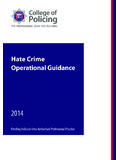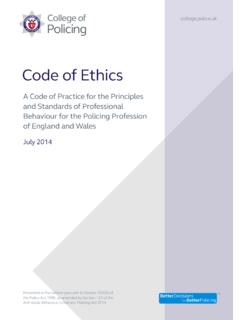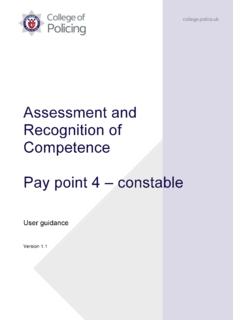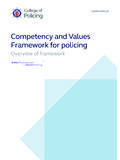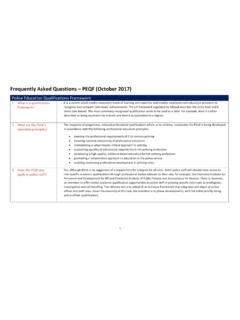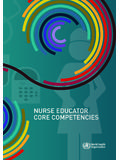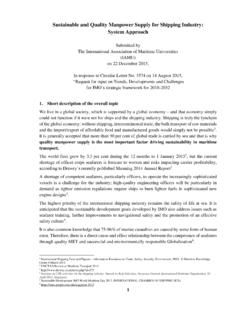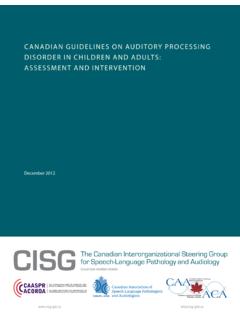Transcription of Professionalising Investigations Programme
1 Professionalising Investigations ProgrammeProgramme policy 2017 OFFICIALC ollege of PolicingiiProgramme policy OFFICIAL College of Policing Limited (2017)All rights reserved. No part of this publication may be reproduced, modified, amended, stored in any retrieval system or transmitted, in any form or by any means, without the prior written permission of the College or as expressly permitted by wishing to copy or re-use all or part of this publication for purposes other than expressly permitted by law will need a licence. Licence applications can be sent to Diane Kennedy, Intellectual Property Rights (IPR) and Licensing Manager, email we have identified any third-party copyright material you will need permission from the copyright holders concerned.
2 This publication may contain public sector information licensed under the Open Government Licence at other enquiries regarding this publication please contact us at or on 0800 4963322 This document has been created with the intention of making the content accessible to the widest range of people regardless of disability or impairment. To enquire about having this document provided in an alternative format please email policy has been developed by the College of Policing Ltd in collaboration with Devon and Cornwall Police on behalf of the police service. The College acknowledges and thanks all those who contributed in the development of this document and is committed to working collaboratively in the future to develop, deliver and maintain the of PolicingiiiProgramme policy OFFICIALC ontentsIntroduction 03 Authorised Professional Practice and the Code of Ethics 04 Investigative principles 04 Accountability structure 05 Definition of investigation 06 Definition of an investigator 07 Categories of investigation 07 Priority and volume Investigations 07 Serious and complex Investigations 08 Major crime and serious and organised crime Investigations 09 Investigative career pathway 10 PIP 1 investigators 10 PIP 1 supervisors 12 The National Investigators Examination 13 PIP 2 investigators 14
3 PIP 2 supervisors 16 PIP 2 managers 18 PIP 3 senior investigators 20 Registration all levels 25 Registration status 25 Workplace assessment extensions 25 Reregistration and continuing professional development 25 Specialist roles retaining accreditation 26 Grandparent rights for those currently in role 27 PIP 1 27 PIP 2 27 PIP 2 investigator 27 PIP 2 supervisor/manager 28 PIP 3 senior investigator serious and organised crime 28 Assessment and verification process 29 Assessor 29 Tutor (PIP 2 investigators ICIDP only) 30 Mentor 30 Internal verifier 31 Quality assurance 31 External verification 31 Appeals procedure 32 Unsatisfactory performance procedure 33 Review and ownership 33 OFFICIALC ollege of Policing3 Programme policy OFFICIALI ntroductionThe Professionalising investigation Programme (PIP) was implemented in 2003.
4 Its vision was:It continues to develop as a Programme following the 2013 PIP review. This ensures that PIP remains current and is balanced against the changing landscape of policing, greater accountability, risk management and increasing public expectations. PIP provides a structured and consistent development and maintenance Programme for investigative skills. It delivers the capability to conduct professional Investigations at all levels in the police service and in other sectors of law overarching aim of PIP is to deliver registration, examination, training, workplace assessment and accreditation to a national standard at each level. The PIP levels are: PIP 1 priority and volume crime Investigations PIP 2 serious and complex Investigations PIP 3 major Investigations PIP 4 strategic management of highly complex policy underpins the Professionalising Investigations Programme , providing clarity on eligibility and career pathways for all levels.
5 Failure to comply with this policy could affect the perception and ability of law enforcement to carry out its function professionally, ethically and effectively in respect of priority and volume, serious and complex, and major crime Investigations . The policy reflects best practice across law Investigations ProgrammeTo deliver a professional, ethical and effective investigation capacity for policing in the 21st century by providing robust, national benchmarked standards maintained and overseen by a professional policing institute. PIP 4 Strategic management of complex investigationsPIP 3 Senior investigators (SIODP)PIP 2 National Investigators Exam (NIE)Crime investigators (ICIDP)Crime supervisors (ISDP)Crime managers (MSCIDP)PIP1 Initial Police Learning (IPLDP)Initial investigators (PIP1 standalone)OFFICIALC ollege of Policing4 Programme policy OFFICIALA uthorised Professional Practice and the Code of EthicsThe principles detailed in Authorised Professional Practice (APP) on investigation and the Code of Ethics should form the basis of all investigative activity, regardless of the level of seriousness or complexity.
6 They are used as the foundation of current investigation training and development programmes. The investigation model outlined in APP is a useful reference point for conducting and managing Investigations . It ensures that all actions to collect material relevant to the case are considered and pursued in accordance with the circumstances. The model does not show Investigations as a simple linear process. It is important to identify at which point in the investigation police action has commenced, and to then ensure that the preceding and subsequent stages of investigation are completed. This will safeguard the collation and evaluation of available material. It will also enable objective decision making, appropriate to the circumstances of each investigation , using the National Decision principles Investigations should be undertaken using appropriately skilled staff.
7 PIP is the national standard and applies to investigators at all levels, assessed and registered as competent against the National Occupational Standards (NOS) relevant to their role. When operational demands and resources are such that appropriately skilled staff are not available for deployment, forces will apply measures to support the investigation to reduce resulting risk to the public, the individual and the organisation. PIP is a development Programme rather than a set of training courses. Access to each level of PIP is based on skills, knowledge and experience. To achieve accreditation, individuals are required to show evidence of individual performance through the relevant PIP portfolio. Where necessary, opportunities for developmental activity should be identified and recorded by line managers.
8 Once accredited, the principle of gain accreditation and keep it is applicable to all PIP levels. Investigators are responsible for their own continuing professional development (CPD) and for maintaining competence year-on-year, as applicable to their role, with relevant and sufficient support from the organisation. Supervisors and managers are critical to effectively deploying and managing investigators and Investigations . They must monitor and review Investigations in accordance with relevant policies and ensure that their staff correctly register and maintain annual of Policing5 Programme policy OFFICIALA ccountability structureOverall responsibility for PIP lies with the College of Policing s Crime and Criminal Justice Faculty and the National Police Chiefs Council (NPCC) PIP lead.
9 The PIP lead is accountable to the NPCC National Crime Operational Coordination Committee, Standards, Competencies and Training of crime are responsible for: the standards of Investigations in their own force ensuring that investigators in their areas are involved in the PIP processes and are aware of and comply with investigation policies ensuring investigative capacity is appropriate to meet the defined standards ensuring that the provision of learning and development is appropriate to enable individuals to achieve competence within the NOS framework appointing a force PIP single point of contact (SPOC).The head of crime, supported by the PIP SPOC, will: provide the focal point for all information and advice linked to the PIP assessment and registration process and disseminate information as appropriate in their force work with the College to inform the future development of PIP ensure compliance with the administration of PIP assessment and registration processes ensure ongoing reviews ensure quality assurance checks of the PIP assessment and registration processes maintain a candidate tracking system, ensuring that sign-off for registration is recorded for each candidate at all levels and a complete and up-to-date registration database for the force is maintained.
10 Including re-registration verify and sign off all PIP 3 registrations prior to advising the College of Policing, PIP registrar for registration on the national database ensure that a force list of assessors, mentors, and internal verifiers is maintained, together with details of the training given and candidates assessed provide appropriate management information manage the appeals process monitor compliance with grandparent of Policing6 Programme policy OFFICIALD epartmental heads, who have command of investigators at any level, are responsible for ensuring that officers and staff adhere to standards of investigation in their business and second line supervisors of investigators are responsible for ensuring that their personnel are appropriately trained, registered and reregistered when of investigationAn investigation is the action of examining, studying or enquiring into something or someone and evaluating material through a considered systematic Code of Practice to the Criminal Procedure and Investigations Act 1996 defines a criminal investigation as:This includes.

